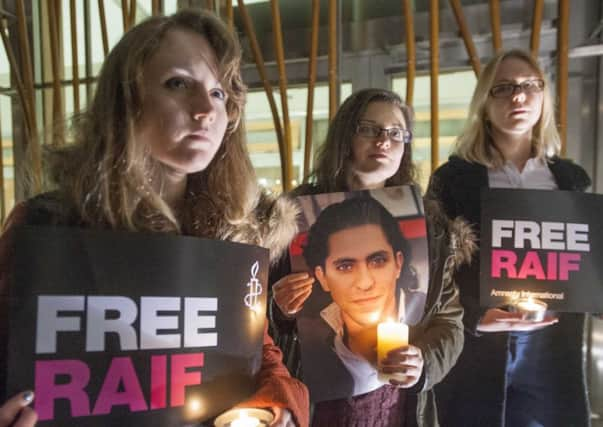Dani Garavelli: King’s death highlights hypocrisy


THE death of King Abdullah of Saudi Arabia – who succumbed, aged 90, to a lung infection last week – could not have come at a better time for activists keen to expose the west’s double standards when it comes to human rights violations. The close relationship the UK and the US maintain with the oil-rich country – which flogs, stones and beheads its citizens with impunity – has persisted for decades, with Abdullah’s “liberalising” agenda and his putative role in the War on Terror used to see off challenges from Amnesty International and its ilk.
But then came the Charlie Hebdo atrocity and world leaders ostentatiously uniting behind a freedom of speech banner. Many of those who joined the march – Israeli prime minister Benjamin Netanyahu, Ukrainian president Petro Poroshenko – had a brass neck showing up, given their own human rights records. But right at the top of the league table of “charlatans” was Mohammed Ismail Al-Sheikh, the Saudi Arabian ambassador to France, who proclaimed “Je Suis Charlie” days after Saudi blogger Raif Badawi was flogged in a public square for insulting Islam – the same “offence” committed by the murdered cartoonists with whom he was expressing solidarity. The 50 lashes Badawi received were just the first batch of 1,000 due to be inflicted over a period of 20 weeks.
Advertisement
Hide AdAdvertisement
Hide AdThe Saudi Arabian ambassador’s flagrant display of humbuggery shone a light on the west’s own hypocrisy: the way the UK and US denounce those countries with little to offer and cosy up to those with oil and regional influence. Now, two weeks on, Abdullah’s death is proving another flashpoint and an opportunity to pile on the pressure for change. As Prime Minister David Cameron joined in a western love-bombing of the late leader, praising him for his “commitment to peace” and requesting Union flags on public buildings to be flown as half-mast, he found himself facing a backlash from those disgusted by our toleration of the monarchy’s harsh punishments, persecution of Christians and Shia Muslims and discrimination against women. Indeed, the tributes united left and right in condemnation. In Scotland, Tory leader Ruth Davidson broke ranks to brand the decision to fly the flag at half-mast “a steaming pile of nonsense”.
All of this casts an uneasy shadow over the condolence-paying trip to Saudi Arabia Cameron and Prince Charles are due to make this weekend, which can only be a good thing.
Of course, it is easier to take the moral high-ground when you aren’t a player on the world stage. Saudi Arabia is one of the UK’s top arms customers (having struck a multi-billion pound deal with BAE during the Thatcher era) and it has contributed $100m to the War on Terror (though the men it sent to fight the Soviet invasion in Afghanistan helped form al-Qaeda and it is still the biggest source of funds for Sunni terror groups across the world). But it seems events like Charlie Hebdo mean the British public is less willing to accept its leaders colluding with monstrous regimes.
Attempts to cast Abdullah as a reformer were ongoing last week. Pointing to the opening of a new mixed-gender university and his role in the Arab Spring, one Associated Press report said “in a kingdom where ultra-conservative Muslim clerics have long held a lock on all aspects of society, [his] incremental reforms echoed mightily”. But when you examine it in any detail, his liberalisation didn’t amount to a hill of beans. His government appointed 30 women to the Shura Council, a consultative body that produces recommendations for the cabinet, but they can’t obtain a passport, marry or work without the say-so of a male relative, and Saudi Arabia is the only country in the world where they aren’t allowed to drive. In the light of all this, the head of the IMF Christine Lagard’s description of Abdullah as an “advocate of women” is an embarrassment.
The political and public backlash to western governments’ fawning is important because this could be a watershed for Saudi Arabia. Abdullah’s successor King Salman is said to be ill – possibly suffering from Alzheimer’s – and Middle Eastern experts believe he will rely on the Crown Prince Muqrin bin Abdulaziz and Deputy Crown Prince Muhammad bin Nayef to govern. In his first public statement, Salman promised “continuity” and “stability”, but he and his half-brother Muqrin will be aware of worldwide concern over the country’s executions (87 last year), concern which has mounted in the wake of leaked mobile phone footage of a woman being beheaded in the street in Mecca. The pressure over Badawi led Abdullah to refer his case to the Supreme Court, if only to get it out of the public eye.
Nor does all the power lie with the House of Saud. The US and UK rely on the country for oil and investment, but, after declaring Islamic State public enemy No 1, Saudi Arabia has little choice but to depend on the US for its security. Not that the US has shown any great desire to castigate its Middle Eastern ally. Obama’s tribute to Abdullah was as obsequious as Cameron’s without attracting nearly as much public opprobrium.
Even if it proves impossible to effect change in Saudi Arabia, the British government should take this opportunity to reflect on the way it has turned a blind eye to the county’s excesses. Pragmatism is one thing, diplomacy another. But you can’t go on spouting platitudes about “British values” while acting as an apologist for another dead tyrant.
FOLLOW US
-----------------------------------------
-----------------------------------------
SCOTSMAN TABLET AND MOBILE APPS